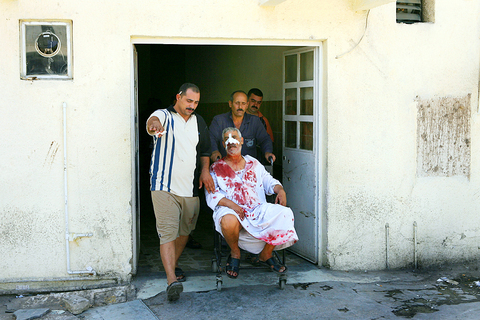Iraqi officials plan to dig a series of trenches around Baghdad in the coming weeks to seal it off and control movement into and out of the city, the New York Times reported yesterday.
The Baghdad anti-terror trench is intended to curb attacks such as the two suicide car bombings yesterday morning that killed at least 11 people and wounded 20 more.
"We're going to build a trench around Baghdad" -- a distance measuring about 97km -- "so we can control the exits and entrances so people will be searched properly," Brigadier General Abdul Karim Khalaf told the Times on Friday in an interview.

PHOTO: AP
"The idea is to get the cars to go through the 28 checkpoints that we set up," the newspaper quoted him as saying.
US officials have approved of the plan, which has been in the works for weeks, the Times said. It calls for cars to be funneled through the checkpoints along the main arteries leading out from the capital, and for smaller roadways to be closed. The trenches themselves would run through farmland or other open land to prevent evasions of the checkpoints, the newspaper said.
The Washington Post, quoting a US military spokesman in Baghdad, said yesterday that checkpoints would be placed along key arteries in and out of Baghdad to ensure that people move through "predictable paths" that can be controlled.
Traffic patterns are being studied and if the plan's outer perimeter is effective some current checkpoints inside the city's borders could be closed to help traffic move along, the Times story said.
The Iraqi official said he did not know the expected cost of the ambitious project, which follows a US-backed security program that set up traffic checkpoints throughout the capital but failed to quell escalating sectarian violence between Sunnis and Shiites.
last month, a new tactic involved moving troops into trouble zones and conducting block by block searches before leaving battalions behind to bolster local residents. That program is expanding into eastern neighborhoods, the Times said.

Right-wing political scientist Laura Fernandez on Sunday won Costa Rica’s presidential election by a landslide, after promising to crack down on rising violence linked to the cocaine trade. Fernandez’s nearest rival, economist Alvaro Ramos, conceded defeat as results showed the ruling party far exceeding the threshold of 40 percent needed to avoid a runoff. With 94 percent of polling stations counted, the political heir of outgoing Costa Rican President Rodrigo Chaves had captured 48.3 percent of the vote compared with Ramos’ 33.4 percent, the Supreme Electoral Tribunal said. As soon as the first results were announced, members of Fernandez’s Sovereign People’s Party

EMERGING FIELDS: The Chinese president said that the two countries would explore cooperation in green technology, the digital economy and artificial intelligence Chinese President Xi Jinping (習近平) yesterday called for an “equal and orderly multipolar world” in the face of “unilateral bullying,” in an apparent jab at the US. Xi was speaking during talks in Beijing with Uruguayan President Yamandu Orsi, the first South American leader to visit China since US special forces captured then-Venezuelan president Nicolas Maduro last month — an operation that Beijing condemned as a violation of sovereignty. Orsi follows a slew of leaders to have visited China seeking to boost ties with the world’s second-largest economy to hedge against US President Donald Trump’s increasingly unpredictable administration. “The international situation is fraught

MORE RESPONSIBILITY: Draftees would be expected to fight alongside professional soldiers, likely requiring the transformation of some training brigades into combat units The armed forces are to start incorporating new conscripts into combined arms brigades this year to enhance combat readiness, the Executive Yuan’s latest policy report said. The new policy would affect Taiwanese men entering the military for their compulsory service, which was extended to one year under reforms by then-president Tsai Ing-wen (蔡英文) in 2022. The conscripts would be trained to operate machine guns, uncrewed aerial vehicles, anti-tank guided missile launchers and Stinger air defense systems, the report said, adding that the basic training would be lengthened to eight weeks. After basic training, conscripts would be sorted into infantry battalions that would take

GROWING AMBITIONS: The scale and tempo of the operations show that the Strait has become the core theater for China to expand its security interests, the report said Chinese military aircraft incursions around Taiwan have surged nearly 15-fold over the past five years, according to a report released yesterday by the Democratic Progressive Party’s (DPP) Department of China Affairs. Sorties in the Taiwan Strait were previously irregular, totaling 380 in 2020, but have since evolved into routine operations, the report showed. “This demonstrates that the Taiwan Strait has become both the starting point and testing ground for Beijing’s expansionist ambitions,” it said. Driven by military expansionism, China is systematically pursuing actions aimed at altering the regional “status quo,” the department said, adding that Taiwan represents the most critical link in China’s